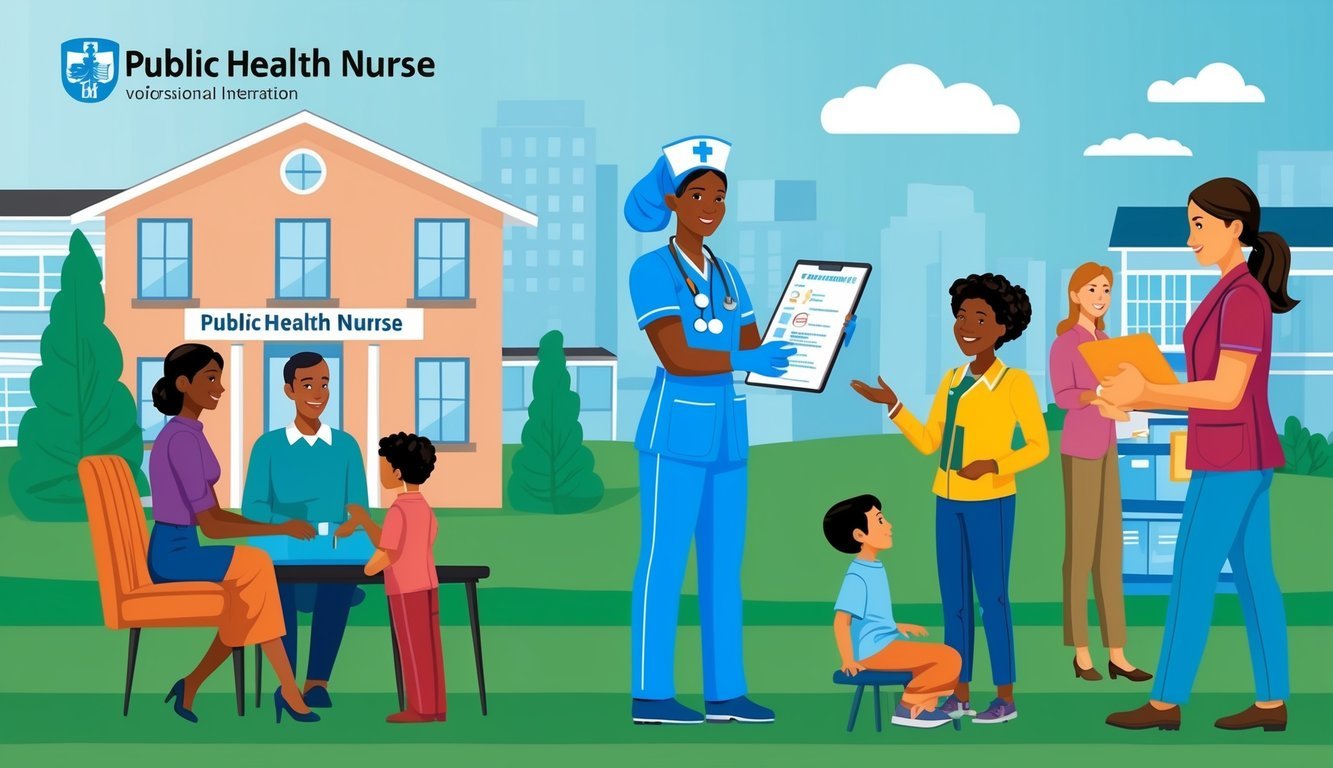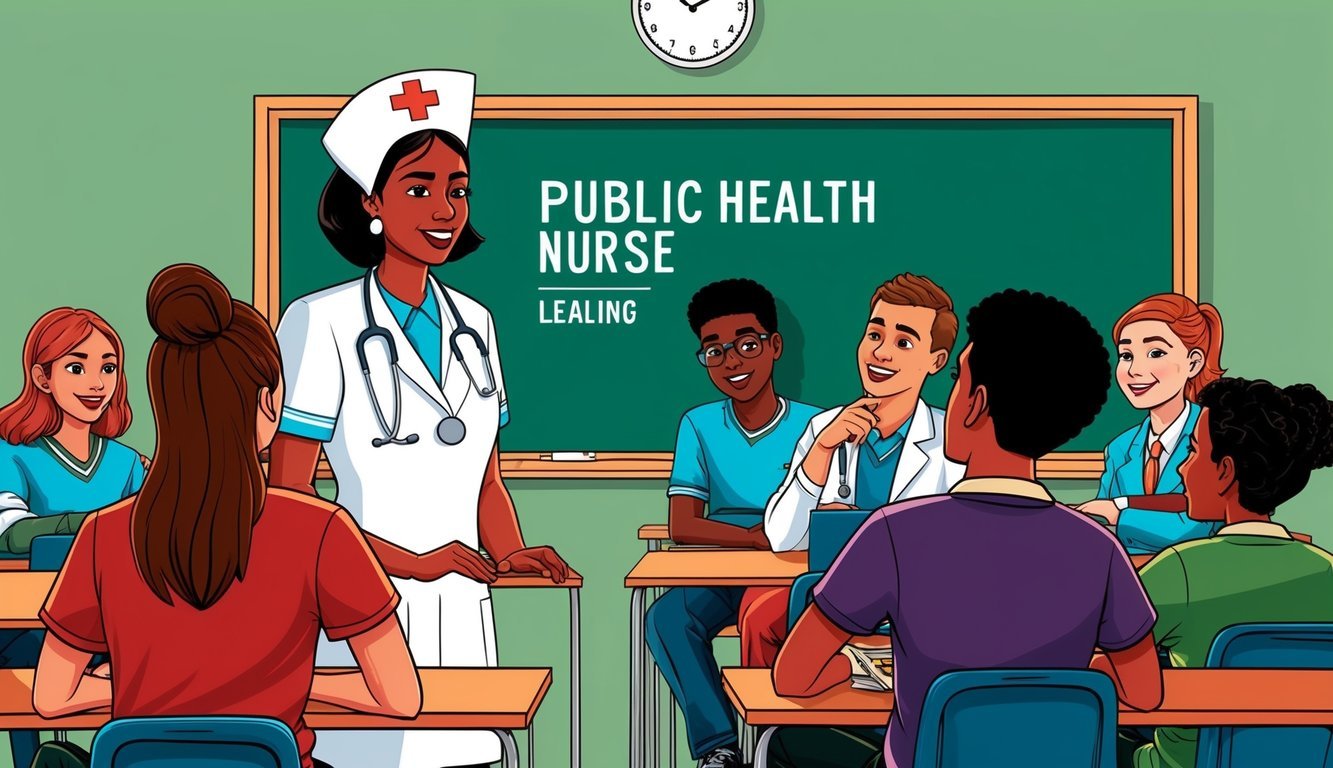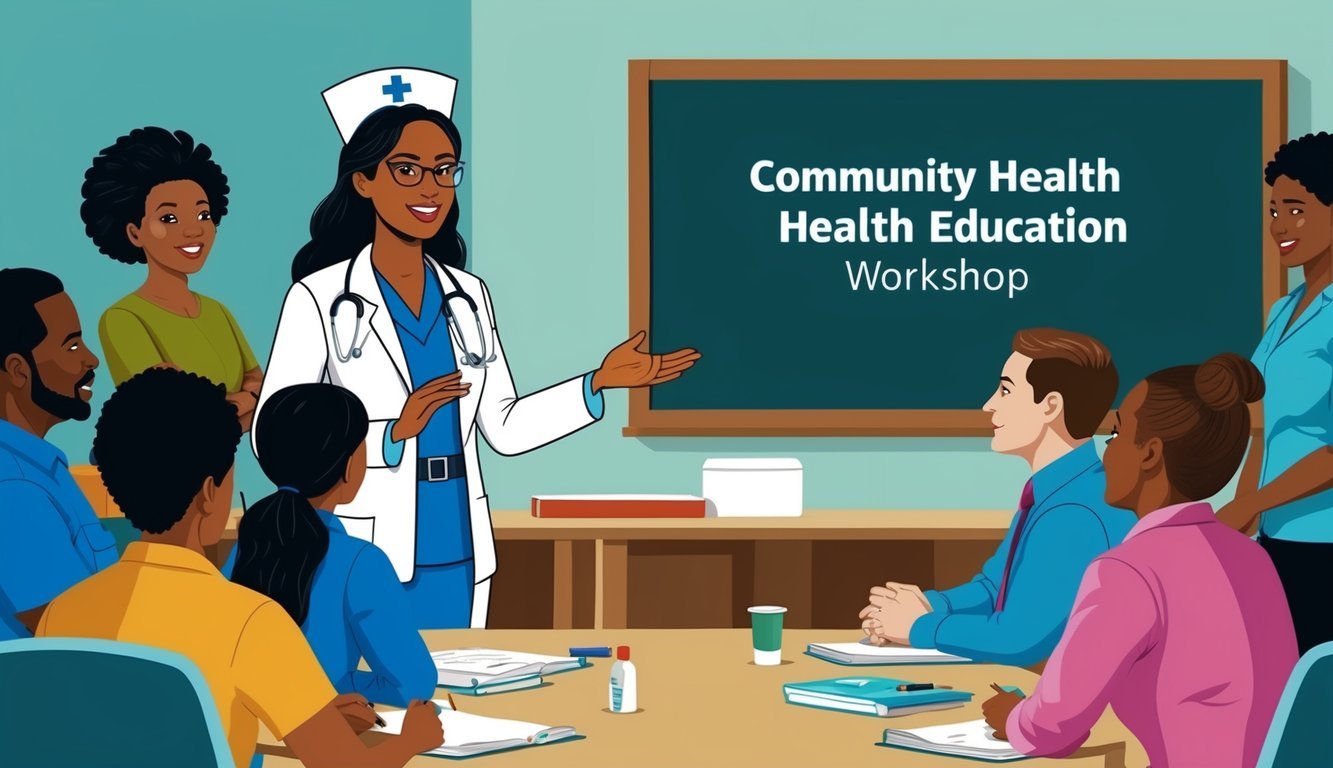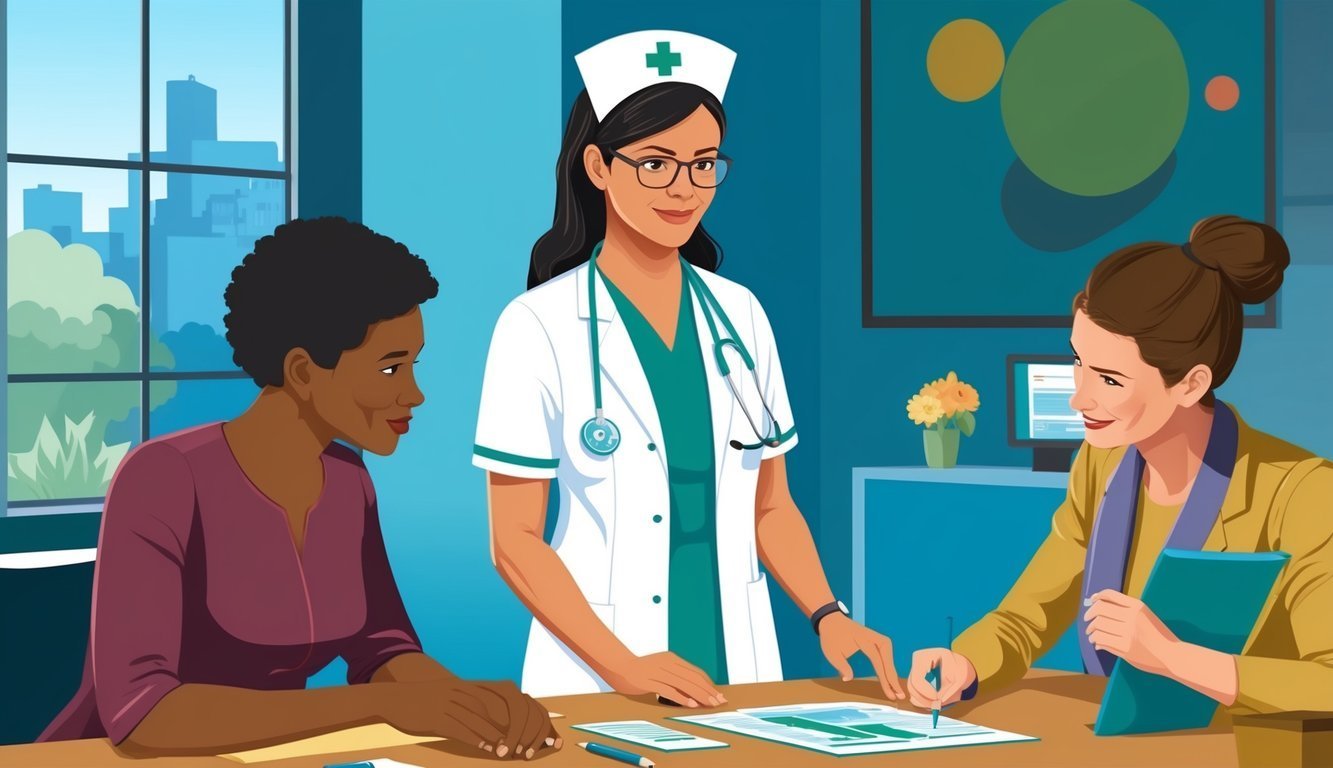Pursuing a master’s degree in public health nursing equips you with the skills to make a significant impact on community health. This advanced degree prepares you to address health trends, develop effective public health programs, and educate populations on vital health issues. By integrating nursing with public health principles, you can become an essential part of a healthcare system focused on prevention and community well-being.
Online learning options for a Public Health Nurse Master’s can provide you with the flexibility to balance your studies with professional and personal commitments.
Institutions like Drexel University offer comprehensive programs that combine theory with practical applications, preparing you for various career paths.
Such programs often include coursework on health policy, epidemiology, and health promotion, aligning with advanced nursing practice standards.
By earning this degree, you position yourself as a leader in the health sector, paving the way for enhanced career opportunities and the ability to effect change.
Access to resources and support through online platforms allows you to connect with peers and professionals in the field, enriching your educational experience.
Consider exploring institutions like Walden University to find a program that aligns with your career goals.
Exploring Public Health Nursing

Public health nursing plays a crucial role in enhancing community health and addressing health disparities.
Through advocacy and targeted initiatives, public health nurses help create a healthier society by focusing on the needs of vulnerable populations.
Role and Scope of Public Health Nursing
Public health nurses (PHNs) focus on promoting health and preventing diseases within communities.
Their role extends beyond treating individuals; they assess community needs, develop health programs, and implement strategies for health promotion.
PHNs work with diverse populations, including vulnerable groups affected by social determinants of health.
They collaborate with various stakeholders, including health departments and non-profit organizations, to improve access to healthcare and promote health equity.
They often engage in activities such as community education, health screenings, and immunization drives.
Their holistic approach addresses not only physical health but also mental and social aspects, maximizing community well-being.
Nursing Practice in Community Health
In community health nursing, you work directly with groups, families, and individuals to assess health needs and provide resources.
This practice emphasizes preventive care, education, and support for maintaining a healthy lifestyle.
The role includes conducting health assessments and implementing community interventions.
You may provide education on topics such as nutrition, exercise, and disease prevention strategies.
Additionally, community health initiatives often seek to reduce health disparities by focusing on high-risk areas.
This ensures that healthcare resources are allocated effectively to enhance overall population health.
Improving Health Outcomes through Nursing
Public health nursing is integral to improving health outcomes at the population level.
By focusing on health promotion and disease prevention, you can significantly impact community health.
Strategies may include developing tailored health programs that address specific needs within the community.
For instance, organizing workshops on chronic disease management can empower individuals to take control of their health.
Through data collection and analysis, you can identify health trends and inform policy decisions.
This evidence-based approach not only enhances healthcare delivery but also supports sustainable health improvements in the community.
Health Policy and Advocacy
Advocacy is a vital component of public health nursing.
You play a key role in influencing health policies that affect community health and access to care.
By engaging with policymakers, you can advocate for resources aimed at addressing health disparities.
Understanding health policy enables you to pinpoint gaps in the current healthcare system.
This knowledge empowers you to push for reforms that enhance health equity and address the needs of vulnerable populations.
Moreover, public health nurses often participate in community coalitions to address systemic issues.
By collaborating with local organizations, you can create comprehensive health initiatives that improve overall community health and enhance health policies.
Master’s-Level Nursing Education

Master’s-level education in nursing equips you with advanced skills and knowledge essential for leadership roles in the healthcare system.
The curriculum focuses on specialized areas such as public health, enhancing your ability to address complex health issues.
Online MSN Programs
Pursuing a Master of Science in Nursing (MSN) online offers flexibility that accommodates your busy schedule while enabling you to specialize in areas like public health.
Programs such as the MSN in Public Health Nursing provide comprehensive training through a mixture of theoretical knowledge and practical application.
You can choose from various accredited online programs that typically include coursework in epidemiology, healthcare policy, and community health assessment.
Many schools offer start dates every few weeks, allowing you to begin your studies at a convenient time.
Financial aid options may also be available to help manage the cost of your education.
Accreditation and Quality Assurance
Accreditation is crucial in assessing the quality of nursing programs.
The American Association of Colleges of Nursing recommends that programs seeking accreditation meet stringent standards for education and clinical practice.
Accreditation bodies such as the Commission on Collegiate Nursing Education (CCNE) ensure that MSN programs provide a solid foundation of nursing principles.
Enrolling in an accredited program ensures that you receive a quality education that will be recognized by employers.
It also opens doors to funding opportunities, enhancing your financial options while pursuing advanced education.
Transitioning: RN to MSN Pathways
Transitioning from an RN to an MSN can be a seamless process through various pathways, including the RN to MSN Bridge Program.
These programs typically recognize your existing experience and provide the necessary coursework to obtain your master’s degree.
Options vary, with some schools offering direct RN to MSN tracks while others might require you to complete a Bachelor of Science in Nursing (BSN) before progressing to a master’s level.
This pathway allows you to expedite your education while gaining advanced practice skills tailored to your career goals, especially in community or public health settings.
Specialized Knowledge and Skills

In the field of public health nursing, acquiring specialized knowledge and skills is crucial for effectively addressing health challenges.
This involves understanding key areas such as epidemiology, health data, and program implementation, which are vital for improving population health outcomes.
Epidemiology and Disease Prevention
Epidemiology focuses on understanding the distribution and determinants of health-related states in populations.
As a public health nurse, you will utilize epidemiological principles to assess community health needs and identify risk factors contributing to disease spread.
Key skills include:
- Surveillance: Monitoring health data to detect outbreaks.
- Assessment: Identifying health disparities and vulnerable populations.
- Intervention Development: Creating strategies for disease prevention tailored to specific communities.
Effective disease prevention efforts often rely on collaboration with local health departments and community organizations to implement targeted initiatives that promote health equity.
Health Data and Biostatistics
Proficiency in health data and biostatistics is essential for analyzing health trends and outcomes.
You will learn to interpret data to inform decisions on resource allocation and program effectiveness.
Important competencies include:
- Data Collection: Gathering qualitative and quantitative health data.
- Statistical Analysis: Applying statistical methods to evaluate health programs.
- Interpretation of Results: Translating complex data into actionable insights for stakeholders.
This expertise supports efforts in global health initiatives and environmental health assessments, helping you advocate for policies that enhance population health.
Implementing Health Programs
Implementing effective health programs is a core component of public health nursing.
You will design, evaluate, and manage programs aimed at improving community health outcomes.
Key components include:
- Program Planning: Developing comprehensive plans that address specific health issues.
- Engagement Strategies: Involving community members in program design for better acceptance and effectiveness.
- Monitoring and Evaluation: Continuously assessing program impact and making data-driven adjustments.
These skills are crucial for those aspiring to roles as health services managers or public health educators, enabling you to lead initiatives that foster social justice and improve health outcomes in diverse populations.
Leadership and Advanced Practice
Effective leadership in public health nursing is crucial for promoting health and influencing policy.
This section discusses strategic decision-making, the role of nursing leadership in health promotion, and the importance of culturally sensitive healthcare delivery.
Strategic Decision-Making in Public Health
In public health, strategic decision-making involves analyzing data to improve health outcomes.
As a public health nurse, you will engage in community assessments, employing diagnostic reasoning to identify health disparities.
Strong leadership skills allow you to advocate for evidence-based healthcare policies that address community needs.
Utilizing outcome-based standards of care ensures that your decisions lead to measurable improvements.
Networking with community health organizations enhances your ability to implement strategies effectively, allowing for a well-rounded approach to health program coordination.
Leadership in Nursing and Health Promotion
You occupy a vital role in leading health promotion initiatives.
Leadership in nursing stresses the importance of advocacy, where you may influence health policies that support patient and community health.
Your skills in advanced nursing research contribute significantly to understanding effective interventions.
Engaging with other healthcare professionals allows you to shape healthcare reform.
Collaborating with interdisciplinary teams, you can align health programs with best practices that focus on vulnerability and healthcare access, ultimately improving community health outcomes.
Culturally Sensitive Healthcare Delivery
Understanding cultural diversity enhances your ability to provide effective healthcare.
Culturally sensitive healthcare delivery is essential in addressing the unique needs of different populations.
You will need to recognize and respect cultural beliefs, tailoring health promotion strategies accordingly.
Training in culturally responsive practices equips you to navigate complex healthcare situations.
This skill is crucial when engaging with individuals from various backgrounds and helps ensure equitable access to healthcare services.
By prioritizing culturally aware practices, you will foster trust and improve health outcomes within diverse communities.
Emphasizing inclusivity leads to better engagement in public health initiatives.
Practical Experience and Career Preparation
Gaining practical experience through hands-on projects and professional networking is crucial in preparing for a career as a public health nurse.
This section highlights the importance of practicum opportunities and the development of valuable connections in the field.
Practicum Project and Field Work
Participating in a practicum project is an essential part of your education.
It typically involves working directly within healthcare services, focusing on underserved communities.
You will apply the knowledge gained in nursing classes while engaging with real-world challenges, such as chronic disease management and analyzing epidemiological data.
The time commitment can vary, often requiring a minimum of 200-300 hours in a practical setting to fulfill degree requirements.
Working alongside nursing faculty allows you to gain insights into public health strategies and interventions.
This hands-on experience is instrumental in understanding health inequities and how social and behavioral sciences play a role in community health.
Professional Networking and Career Pathways
Building a network within the public health community can significantly impact your career opportunities.
Attend workshops, conferences, and local events to meet professionals in the field.
Connecting with organizations focused on health issues related to global warming and other contemporary challenges can open doors.
Consider joining associations that offer scholarships or facilitate transfer credits for further education.
Mentorship from experienced public health nurses can provide guidance on navigating your career path.
Establish relationships that may lead to potential job opportunities in various healthcare settings, including non-profit organizations and government agencies dedicated to public health advancements.

